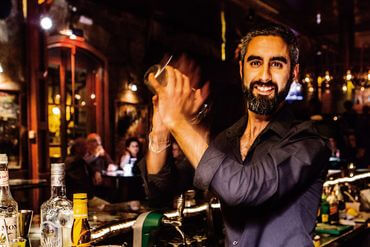
Carlos and Bartolomé
There cannot be a single visitor to the island of Ibiza who leaves without trying the famous hierbas ibicencas, nor can there be any islander who refuses the offer to round off dinner with this traditional liqueur. Hierbas ibicencas are synonymous with Familia Marí Mayans who, for five generations, have dedicated themselves to the production of traditional liqueurs including frígola (a liqueur based on wild thyme and orange), palo (a liqueur based on bark from the cinchona tree), hierbas ibicencas, and a kind of absinthe. Three years ago, IBZ Ginebra Premium (gin), the recipe for which goes back over 80 years, was added to the range.
Bartolomé and Carlos Marí Mayans run the company that was founded by their great-great-grandfather on the island of Formentera towards the end of the nineteenth century. And, although many people nowadays associate their family name with hierbas ibicencas, in fact, it all began with frígola “because the house of the person who invented it was surrounded by wild thyme and orange trees,” and later moved on to produce palo. But the real boom in hierbas ibicencas did not happen until the 1970s. Currently, Familia Marí Mayans accounts for 90% of the market for different types of traditional Ibizan liqueurs, and the company harvests, macerates, distils and bottles 100% of its products in Ibiza.
The business was founded in 1880. Juan Marí Mayans was a merchant based in Formentera who owned a small llaüt (traditional sailing boat) which, from time to time, he took to Barcelona to bring back basic supplies such as sewing thread, needles and preserves for the residents of the island. On one of these trips, he found work at a distillery in Barcelona. There, he learnt the secrets of distillation and all he needed to know to distil his own liqueurs. With his expert knowledge of aromatic plants, he soon began to experiment with making different kinds of concoctions which he went around selling to his neighbours. At that time, Juan practised as a herbalist, prescribing infusions and syrups to relieve various kinds of ailments. His famous recipes for frígola and hierbas ibicencas were originally created as a digestive “syrup.” After several years of experiments and trials, Juan Marí Mayans set up the first ever distillery on Formentera, where he began producing eight-litre batches, which he himself subsequently divided up for sale. Not long afterwards, he moved to Ibiza, where his business could prosper. “We are always pleased to say that it all began on Formentera, and that is why we have such a close link to the island. In fact, we have several Formentera-related projects in mind,” explain Bartolomé and Carlos Marí Mayans.
Juan Marí Mayans set up the first ever distillery on Formentera, where he began producing eight-litre batches.

Ingredients to make liqueurs Familia Marí Mayans
One hundred and forty years after those eight-litre production batches, Familia Marí Mayans has gone on to make around 500,000 litres of hierbas ibicencas a year. “None of this would have been possible without the careful collection of formulas and recipes that our family has kept since they started out in 1880, or without the intensive study of the effects and benefits of aromatic plants that were undertaken by our ancestors,” declare Bartolomé and Carlos. The formulas of their liqueurs have changed little since then. “We keep the tradition and the craftsmanship alive. We’ve added technological and technical methods of doing things that did not exist back then, and now we have a rigorous quality department. It should be borne in mind that in the past, everything was measured ‘by sight’. We strictly respect the final formula; we have only adjusted the alcohol content and the sugar levels, but you’d be amazed if you saw how many formulas were created before we arrived at the definitive version. They tried all sorts of ingredients; there is even a formula that includes spinach!,” says Bartolomé Marí Mayans. And he adds, “to produce a good distillate, you have to do more than mix together alcohol, water and plants. You need to know precisely how much of each ingredient to add. It’s complicated, but our ancestors studied all this very thoroughly, and we respect their work 100%. There was a great deal of trial and error before our time, and we’re very proud of that.” Fortunately, some things have moved on: now, for example, they have a mains gas supply to provide the heat for melting the sugar and distilling. “Seventy years ago, our grandparents heated it on a wood fire, and stirred it with a stick,” they explain.
None of this would have been possible without the careful collection of formulas and recipes that our family has kept since they started out in 1880
The Marí Mayans brothers insist that today they work very hard: “nobody has taken away our nights spent bottling and distilling with our ‘McChicken’,” they joke—but they appreciate the value of the work done by their ancestors, “they sweated blood so that we could be where we are today.” Our hierbas ibicencas tastes quite unlike other brands, because ours is made in a completely different way. We work with each plant independently, paying attention to its alcohol content, and taking into account whether it should be macerated, distilled, infused or brought to the boil… We don’t use saccharin or glucose for sweetening; we make a home-style syrup, based on cold water and sugar, and this is what gives our hierbas ibicencas its characteristic density and lustre,” explain Carlos and Bartolomé Marí Mayans.
The Familia Marí Mayans brand reflects the history and development of Ibiza. From their beginnings in making digestifs for local people, they have gone on to seduce the palates of young people all over the world, and their hierbas ibicencas has become, not merely an icon of the island, but also a tipple that is de rigueur in the most famous clubs and discos in the world. Some of the best DJs on the planet have fallen in love with this liqueur, and this has led to the brand being exported to the United States and other countries including Germany, Italy, Switzerland, Holland and the United Kingdom. Although, as Carlos Marí Mayans explains, “such is the deep attachment that Ibizans feel for this liqueur, and such is the taste for it among the tourists who visit Ibiza, that 80% of the hierbas ibicencas produced remains on the island.” And in spite of being very grateful for the growth in their brand resulting from electronic music and nightlife, the brothers do not forget their roots, and express the wish that their name continues to be closely linked with the Ibizan culinary tradition. Their brand is on the list of the island’s Protected Geographical Indication products. This genuine taste of Ibiza has now been known for over a century, and its recipe is the Marí Mayans family’s most treasured possession, because with it they fill your glass with the island’s magic.

Hierbas Ibicencas liqueur






